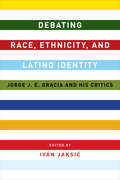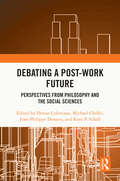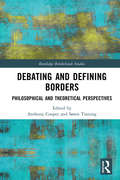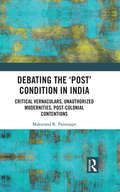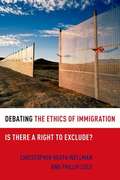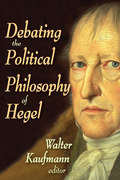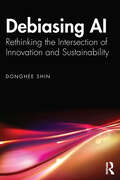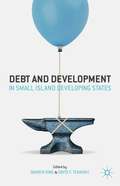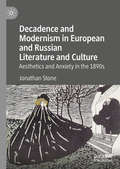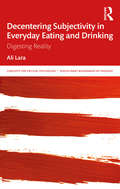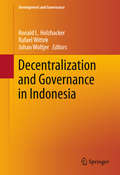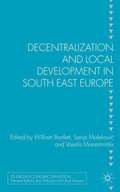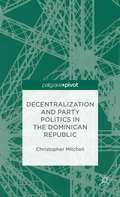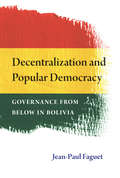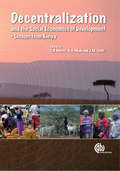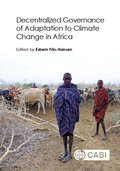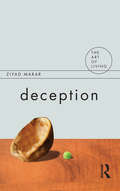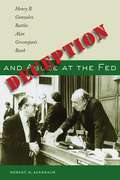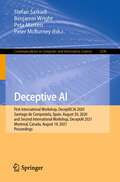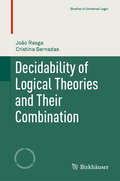- Table View
- List View
Debating Race, Ethnicity, and Latino Identity
by Iván JaksicThe philosopher Jorge J. E. Gracia engages fifteen prominent scholars on race, ethnicity, nationality, and Hispanic/Latino identity in the United States. Their discussion joins two distinct traditions: the philosophy of race begun by African Americans in the nineteenth century, and the search for an understanding of identity initiated by Latin American philosophers in the sixteenth century. Participants include Linda M. Alcoff, K. Anthony Appiah, Richard J. Bernstein, Lawrence Blum, Robert Gooding-Williams, Eduardo Mendieta, and Lucius T. Outlaw Jr., and their dialogue reflects the analytic, Aristotelian, Continental, literary, Marxist, and pragmatic schools of thought.These intellectuals start with the philosophy of Hispanics/Latinos in the United States and then move to the philosophy of African Americans and Anglo Americans in the United States and the philosophy of Latin Americans in Latin America. Gracia and his interlocutors discuss the nature of race and ethnicity and their relation to nationality, linguistic rights, matters of identity, and Affirmative Action, binding the concepts of race and ethnicity together in ways that open new paths of inquiry. Gracia's familial-historical theory of ethnic and Hispanic/Latino identity operates at the center of each of these discussions, providing vivid access to the philosopher's provocative arguments while adding unique depth to issues that each of us struggles to understand.
Debating Race, Ethnicity, and Latino Identity: Jorge J. E. Gracia and His Critics
by Ed. Jaksić IvánThe philosopher Jorge J. E. Gracia engages fifteen prominent scholars on race, ethnicity, nationality, and Hispanic/Latino identity in the United States. Their discussion joins two distinct traditions: the philosophy of race begun by African Americans in the nineteenth century, and the search for an understanding of identity initiated by Latin American philosophers in the sixteenth century. Participants include Linda M. Alcoff, K. Anthony Appiah, Richard J. Bernstein, Lawrence Blum, Robert Gooding-Williams, Eduardo Mendieta, and Lucius T. Outlaw Jr., and their dialogue reflects the analytic, Aristotelian, Continental, literary, Marxist, and pragmatic schools of thought. These intellectuals start with the philosophy of Hispanics/Latinos in the United States and then move to the philosophy of African Americans and Anglo Americans in the United States and the philosophy of Latin Americans in Latin America. Gracia and his interlocutors debate the nature of race and ethnicity and their relation to nationality, linguistic rights, matters of identity, and Affirmative Action, binding the concepts of race and ethnicity together in ways that open new paths of inquiry. Gracia's Familial-Historical View of ethnic and Hispanic/Latino identity operates at the center of each of these discussions, providing vivid access to the philosopher's provocative arguments while adding unique depth to issues that each of us struggles to understand.
Debating a Post-Work Future: Perspectives from Philosophy and the Social Sciences
by Michael Cholbi Jean-Philippe Deranty Denise Celentano Kory P. SchaffThe book provides a comprehensive, critical overview of philosophical, social-scientific, and humanistic arguments about the design and desirability of “post-work” society. Its purpose is to clarify the concepts and theories that inform this debate by exploring the diversity of arguments from a wide range of perspectives about the meaning of a “post-work” future.The book’s 12 chapters were written exclusively for the volume by an international team of researchers in philosophy, political science, gender studies, law, sociology, history, and engineering. They are organized into four larger sections: I. Defining the “Post-Work” DebateII. From Past to FutureIII. The Value and Conditions of Work vs. Post-WorkIV. The Politics and Justice of Post-WorkAfter a general introduction and then an initial round-table discussion among four leading theorists, the book explores topics like work as an evolving social invention, the possible effects of a shorter work week and UBI, automation, climate change, and the roles of Marxism, capitalism, and democracy in a post-work future.
Debating and Defining Borders: Philosophical and Theoretical Perspectives (Routledge Borderlands Studies)
by Anthony Cooper Søren TinningThis book brings together insights from border scholars and philosophers to ask how we are to define and understand concepts of borders today. Borders have a defining role in contemporary societies. Take, for example, the 2016 US election and the UK Brexit referendum, and subsequent debate, where the rhetoric and symbolism of border controls proved fundamental to the outcomes. However, borders are also becoming ever more multifaceted and complex, representing intersections of political, economical, social, and cultural interests. For some, borders are tangible, situated in time and place; for others, the nature of borders can be abstracted and discussed in general terms. By discussing borders philosophically and theoretically, this edited collection tackles head on the most defi ning and challenging questions within the fi eld of border studies regarding the defi nition of its very object of study. Part 1 of the book consists of theoretical contributions from border scholars, Part 2 takes a philosophical approach, and Part 3 brings together chapters where philosophy and border studies are directly related. Borders intersect with the key issues of our time, from migration, climate change vulnerability, terror, globalization, inequality, and nationalism, to intertwining questions of culture, identity, ideology, and religion. This book will be of interest to those studying in these fields, and most especially to researchers of border studies and philosophy.
Debating the 'Post' Condition in India: Critical Vernaculars, Unauthorized Modernities, Post-Colonial Contentions
by Makarand R. ParanjapeHow was the post-modernist project contested, subverted and assimilated in India? This book offers a personal account and an intellectual history of its reception and response. Tracing independent India’s engagement with Western critical theory, Paranjape outlines both its past and ‘post’. The book explores the discursive trajectories of post-modernism, post-colonialism, post-Marxism, post-nationalism, post-feminism, post-secularism — the relations that mediate them — as well as interprets, in the light of these discussions, core tenets of Indian philosophical thought. Paranjape argues that India’s response to the modernist project is neither submission, willing or reluctant, nor repudiation, intentional or forced; rather India’s ‘modernity’ is ‘unauthorized’, different, subversive, alter-native and alter-modern. The book makes the case for a new integrative hermeneutics, the idea of the indigenous ‘critical vernacular’, and presents a radical shift in the understanding of svaraj (beyond decolonisation and nationalism) to express transformations at both personal and political levels. A key intervention in Indian critical theory, this volume will interest researchers and scholars of literature, philosophy, political theory, culture studies and postcolonial studies.
Debating the Ethics of Immigration: Is There A Right to Exclude?
by Christopher Heath Wellman Phillip ColeDo states have the right to prevent potential immigrants from crossing their borders, or should people have the freedom to migrate and settle wherever they wish? Christopher Heath Wellman and Phillip Cole develop and defend opposing answers to this timely and important question. Appealing to the right to freedom of association, Wellman contends that legitimate states have broad discretion to exclude potential immigrants, even those who desperately seek to enter. Against this, Cole argues that the commitment to the moral equality of all human beings - which legitimate states can be expected to hold - means national borders must be open: equal respect requires equal access, both to territory and membership; and that the idea of open borders is less radical than it seems when we consider how many territorial and community boundaries have this open nature. In addition to engaging with each other's arguments, Wellman and Cole address a range of central questions and prominent positions on this topic. The authors therefore provide a critical overview of the major contributions to the ethics of migration, as well as developing original, provocative positions of their own.
Debating the Faith: Religion and Letter Writing in Great Britain, 1550-1800
by Anne Dunan-Page Clotilde PrunierThe first book to address the role of correspondence in the study of religion, Debating the Faith: Religion and Letter Writing in Great Britain, 1550-1800 shows how letters shaped religious debate in early-modern and Enlightenment Britain, and discusses the materiality of the letters as well as questions of form and genre. Particular attention is paid to the contexts in which letters were composed, sent, read, distributed, and then destroyed, copied or printed, in periods of religious tolerance or persecution. The opening section, 'Protestant identities', examines the importance of letters in the shaping of British protestantism from the underground correspondence of Protestant martyrs in the reign of Mary I to dissident letters after the Act of Toleration. 'Representations of British Catholicism', explores the way English, Irish and Scottish Catholics, whether in exile or at home, defined their faith, established epistolary networks, and addressed political and religious allegiances in the face of adversity. The last part, 'Religion, science and philosophy', focuses on the religious content of correspondence between natural scientists and philosophers.
Debating the Political Philosophy of Hegel
by Walter KaufmannFew philosophers have had as much influence as Hegel. When he died in 1831, he not only dominated German philosophy, but also left his mark on the study of religion and art, on historical studies, and on political thought. Much later, Lenin insisted that no one could completely comprehend Karl Marx unless he had first made a thorough study of Hegel. Later, it became fashionable to link Hegel with Nazism and communism. There is today broad agreement that knowledge of Hegel's thought adds a critical dimension to our understanding of recent cultural and political history.This volume, first published in 1970, focuses on Hegel's political philosophy. It brings together ten essays by six authors who present sharply conflicting interpretations. Here are point-by-point discussions, from differing perspectives, on Hegel's philosophy of the state and his ideas about history and war, nationalism and liberty. Never before have these issues been joined in comparable fashion in a single volume.Sidney Hook sees Hegel as "the very model of a small - minded, timid Continental conservative" and accuses him of "the most specious reasoning that ever disgraced a philosopher," and E. F. Carritt argues for a "totalitarian" reading of Hegel, while T. M. Knox and Shlomo Avineri defend Hegel against these and other charges. The book also contains a short contribution by Z. A. Pelczynski and Walter Kaufmann's "The Hegel Myth and Its Method." Walter Kaufmann, an outstanding historian of European ideas in philosophy, furnished an introduction as well as footnotes that help to clarify perplexing issues and in some cases seek to put an end to long-lived errors. His analysis is itself a major contribution to Hegel's political theories.
Debiasing AI: Rethinking the Intersection of Innovation and Sustainability
by Donghee ShinIn an era where artificial intelligence (AI) drives unprecedented change, Debiasing AI examines the vital intersection of technology, innovation, and sustainability. This book confronts the pressing challenge of bias in AI systems, exploring its far-reaching implications for fairness, trust, and ethical practices. Through a multidisciplinary lens, the author examines how human biases are embedded in large language models, amplified by coded machine learning, and propagated through trained algorithms. Practical strategies are offered to address these issues, paving the way for the development of more equitable and inclusive AI technologies.With actionable insights, empirical case studies, and theoretical frameworks, Debiasing AI offers a roadmap for designing AI technologies that are not only innovative but also ethically sound and equitable. A must-read for scholars, industry leaders, and policymakers, this book inspires a reimagining of AI’s role in creating a fairer and more sustainable future.
Debt And Development In Small Island Developing States
by Damien King David F. TennantDebt and Development in Small Island Developing States draws on the expertise of established researchers and public officials from within the SIDS community to answer the following pressing questions related to sustainability, debt accumulation, and prospects for future growth.
Debunking Arguments in Ethics
by Hanno SauerIn this crisply written book, Hanno Sauer offers the first book-length treatment of debunking arguments in ethics, developing an empirically informed and philosophically sophisticated account of genealogical arguments and their significance for the reliability of moral cognition. He breaks new ground by introducing a series of novel distinctions into the current debate, which allows him to develop a framework for assessing the prospects of debunking or vindicating our moral intuitions. He also challenges the justification of some of our moral judgments by showing that they are based on epistemically defective processes. His book is an original, cutting-edge contribution to the burgeoning field of empirically informed metaethics, and will interest philosophers, psychologists, and anyone interested in how - and whether - moral judgment works.
Decadence and Modernism in European and Russian Literature and Culture: Aesthetics and Anxiety in the 1890s
by Jonathan StoneDecadence and Modernism in European and Russian Literature and Culture: Aesthetics and Anxiety in the 1890s rewrites the story of early modernist literature and culture by drawing out the tensions underlying its simultaneous engagement with Decadence and Symbolism, the unsustainable combination of this world and the other. With a broadly framed literary and cultural approach, Jonathan Stone examines a shift in perspective that explodes the notion of reality and showcases the uneasy relationship between the tangible and intangible aspects of the surrounding world. Modernism quenches a growing fascination with the ephemeral and that which cannot be seen while also doubling down on the significance of the material world and finding profound meaning in the physical and the corporeal. Decadence and Symbolism complement the broader historical trajectory of the fin de siècle by affirming the novelty of a modernist mindset and offering an alternative to the empirical and positivistic atmosphere of the nineteenth century. Stone seeks to recreate a significant historical and cultural moment in the development of modernity, a moment that embraces the concept of Decadence while repurposing its aesthetic and social import to help navigate the fundamental changes that accompanied the dawn of the twentieth century.
Decentering Subjectivity in Everyday Eating and Drinking: Digesting Reality (Concepts for Critical Psychology)
by Ali LaraThis important book offers a model to analyze the configurations of reality as manifested in everyday practices of eating and drinking in relation to the development of human subjectivity. The author uses concrete examples from daily life related to eating and drinking habits such as "eating tacos" or "taking a shot of mezcal", to offer an interface of interaction between body/mind and material entities connecting all scales of reality. Borrowing scientific insights from molecular biology and neuroscience, combined with a touch of decolonial spirit, the author examines specific 'processes' and/or 'objects' triggered by eating and drinking events, such as the production of heat as you eat a taco, or the interchange of knowledge while drinking mezcal. The book develops an approach to human subjectivity informed by material and aesthetic encounters beyond the analysis of language, representation, and social structures and aims to contribute to the contemporary landscape of efforts decentering our understanding of both human and non-human affairs. With its multidimensional exploration of our relationship with food, this is thought-provoking reading for scholars and students in critical psychology, philosophy, and the social sciences.
Decentralization and Governance in Indonesia
by Rafael Wittek Ronald L. Holzhacker Johan WoltjerIndonesia over the past two decades has embarked on a process of decentralization as part of a broader process of democratization, which followed earlier periods of centralized governance and authoritarian rule across the archipelago. The purpose of this book is to begin to explore the connections between governance and sustainable society in a wide variety of policy fields in Indonesia, and how reforming governance structures may contribute to societal benefits and the creation of a long-term sustainable society. This book bridges important theoretical debates related to governance and sustainable society and provides empirical research from Indonesia in important policy areas related to this debate. By placing research in different policy areas in a single volume, the link to the broader concepts of governance, decentralization, and societal outcomes is strengthened. The book builds on the recent interest that has focused on Indonesia and the continued development of democracy in the country. The chapters in the book show a rich variety of decentralized governance arrangements and capacity building at the local level in particular. Central standards (for example for social sustainability, anti-corruption arrangements, or for dealing with direct foreign investment), combined with local innovation (for example for municipal coordination of primary health care or metropolitan transport), are key to Indonesia as a country in a continuing process of transformation. We identify three key trends in the on-going process of decentralization and governance in Indonesia. First, we find that formal governance, the relation between the national and local government, is characterized by a system of ''variable geometry multi-level governance'' depending on the policy area. The challenge ahead is strengthening accountability mechanisms to assure national standards while preserving and encouraging local innovation. Secondly, informal governance mechanisms are evolving to move from ''hierarchical to network'' forms of governance. Here the challenge is to insure democratic input by citizens and civil society organizations. Finally, we identify a trend toward ''shared value creation and sustainable cooperation. '' Indonesia is beginning to move from a rather singular policy focus on economic growth to a more complex and developing notion of policymaking for inclusive growth and the creation of a sustainable society for present and future generations. Here the challenge is sound implementation and to increase the effectiveness of governance mechanisms. There is also a noted diffusion of goals, to focus beyond the Jakarta metropolitan area to smaller regional cities, as urbanization continues and rural areas are changing. This book will be of interest for use in advanced undergraduate and graduate courses related to Southeast Asia in the fields of international relations, political science, public administration, economics, law, sociology, educa tion, public health, and the spatial sciences. It will also be of interest to policymakers and government officials at the national and local level in Southeast Asia and middle-income developing countries, officials and policymakers in institutions of regional governance such as the Association of Southeast Asian Nations (ASEAN), and of global governance such as the United Nations and World Bank. It will also be of interest to civil society organizations and other actors focused on policy development and economic development, health, education, the environment, sustainable transport, etc. The book will also be of interest to business people interested in economic and governance issues, such as the management and governance of in-bound foreign investment, inclusive growth, and corporate governance. Finally, the book should be of interest to citizens in advanced, middle-income, and developing countries motivated to learn more about the links between governance and the creation of a sustainable society for current and future generations.
Decentralization and Intrastate Struggles
by Kristin M. BakkeThere is no one-size-fits-all decentralized fix to deeply divided and conflict-ridden states. One of the hotly debated policy prescriptions for states facing self-determination demands is some form of decentralized governance - including regional autonomy arrangements and federalism - which grants minority groups a degree of self-rule. Yet the track record of existing decentralized states suggests that these have widely divergent capacity to contain conflicts within their borders. Through in-depth case studies of Chechnya, Punjab and Québec, as well as a statistical cross-country analysis, this book argues that while policy, fiscal approach, and political decentralization can, indeed, be peace-preserving at times, the effects of these institutions are conditioned by traits of the societies they (are meant to) govern. Decentralization may help preserve peace in one country or in one region, but it may have just the opposite effect in a country or region with different ethnic and economic characteristics.
Decentralization and Local Development in South East Europe
by Sanja Malekovic Vassilis MonastiriotisDecentralisation is changing the face of South East Europe. This book provides practical analysis of the devolutionary measures reshaping post-Communist economies. Using case studies from Croatia, the former Yugoslavia, Albania and more, this collection offers valuable insights into political and fiscal redistribution.
Decentralization and Party Politics in the Dominican Republic
by Christopher MitchellRecently in the Dominican Republic, a pro-municipal social alliance pressed for decentralization and politicians yielded, seeking power in three-party competition. This study examines how electoral, financial, and administrative power has been dispersed and suggests innovative strategies to maintain decentralizing momentum.
Decentralization and Popular Democracy: Governance from Below in Bolivia
by Jean-Paul FaguetBolivia decentralized in an effort to deepen democracy, improve public services, and make government more accountable. Unlike many countries, Bolivia succeeded. Over the past generation, public investment shifted dramatically toward primary services and resource distribution became far more equitable, partly due to the creation of new local governments. Many municipalities responded to decentralization with transparent, accountable government, yet others suffered ineptitude, corruption, or both. Why? Jean-Paul Faguet combines broad econometric data with deep qualitative evidence to investigate the social underpinnings of governance. He shows how the interaction of civic groups and business interests determines the quality of local decision making. In order to understand decentralization, Faguet argues, we must understand governance from the ground up. Drawing on his findings, he offers an evaluation of the potential benefits of decentralization and recommendations for structuring successful reform.
Decentralization and Subnational Politics in Latin America
by Tulia G. FalletiIs it always true that decentralization reforms put more power in the hands of governors and mayors? In postdevelopmental Latin America, the surprising answer to this question is no. In fact, a variety of outcomes are possible, depending largely on who initiates the reforms, how they are initiated, and in what order they are introduced. Tulia G. Falleti draws on extensive fieldwork, in-depth interviews, archival records, and quantitative data to explain the trajectories of decentralization processes and their markedly different outcomes in Argentina, Brazil, Colombia, and Mexico. In her analysis, she develops a sequential theory and method that are successful in explaining this counterintuitive result. Her research contributes to the literature on path dependence and institutional evolution and will be of interest to scholars of decentralization, federalism, subnational politics, intergovernmental relations, and Latin American politics.
Decentralization and the Social Economics of Development: Lessons from Kenya
by Christopher B. Barrett Andrew G. Mude John M. OmitiBarrett (applied economics and management, Cornell U. , US), Mude (International Livestock Research Institute, Kenya), and Omiti (Kenya Institute of Public Policy Research and Analysis, Kenya) present research conducted under the auspices of the Strategies and Analysis for Growth and Access project, a USAID funded program cooperatively directed by Cornell and Clark Atlanta Universities. The specific subject of the research presented here concerns the effect of various forms of decentralization on rural development, individual and group empowerment, and rural well-being in Kenya, as well as the institutional correlates of successful and unsuccessful decentralization efforts.
Decentralized Governance of Adaptation to Climate Change in Africa
by Esbern Friis-HansenTwo perspectives have dominated the social science discourse on climate change adaptation. Firstly, an international narrative among UN and donor agencies of technical and financial support for planned climate change adaptation. Secondly, a significant volume of studies discuss how local communities can undertake their own autonomous adaptation. Effective and sustainable climate adaptation requires a third focus: understanding of the political processes within sub-national institutions that mediate between national and local practices. This book address the knowledge gap that currently exists about the role of district-level institutions in Sub-Saharan Africa in providing an enabling institutional environment for rural climate change adaptation. Key Features: #65533; Analyses the disconnect between national and local policy and practice, and how to overcome it #65533; Analysis of the political ecology of climate change adaptation in 10 diverse rural districts across Sub-Saharan Africa based on evidence from thorough field work #65533; Explains how to improve the efficiency and effectiveness of climate change adaptation programmes by engaging with decentralized local governments and principles of subsidiarity with regards to decision-making and control over financial resources
Deception (The Art of Living)
by Ziyad MararMost of us think we are about 15 per cent cleverer, nicer, more attractive and better drivers than others think we are. It seems deception begins at home. After all the most convincing liars convince themselves first. Sellers and buyers, parents and children, friends and lovers must conceal from each other the unutterable truth that they don't believe or want the same things. In this book, Ziyad Marar throws a revealing light on the many ways deception is woven into the texture of human life: our wiring leaves us easily suckered by persuasive illusions, while our contradictory desires (for sex and honesty, money and kindness, for cake and losing weight) force us to cook up self-serving stories. We manage flattering impressions with effortless skill, while pretending our sins and self-indulgences are beyond our control.Drawing on insights from philosophy, psychology and literature, Marar explores the implications for living well in the shadow of Kant's humbling thought that "out of the crooked timber of humanity, no straight thing was ever made".
Deception and Abuse at the Fed
by Robert D. Auerbach Henry B. Gonzalez Battles Alan Greenspan'S BankThe Federal Reserve-the central bank of the United States-is the most powerful peacetime bureaucracy in the federal government. Under the chairmanship of Alan Greenspan (1987-2006), the Fed achieved near mythical status for its part in managing the economy, and Greenspan was lauded as a genius. Few seemed to notice or care that Fed officials operated secretly with almost no public accountability. There was a courageous exception to this lack of oversight, however: Henry B. Gonzalez (D-TX)-chairman of the U. S. House of Representatives Financial Services (banking) Committee. In Deception and Abuse at the Fed, Robert Auerbach, a former banking committee investigator, recounts major instances of Fed mismanagement and abuse of power that were exposed by Rep. Gonzalez, including:- Blocking Congress and the public from holding powerful Fed officials accountable by falsely declaring-for 17 years-it had no transcripts of its meetings;- Manipulating the stock and bond markets in 1994 under cover of a preemptive strike against inflation;- Allowing $5. 5 billion to be sent to Saddam Hussein from a small Atlanta branch of a foreign bank-the result of faulty bank examination practices by the Fed;- Stonewalling Congressional investigations and misleading the Washington Post about the $6,300 found on the Watergate burglars. Auerbach provides documentation of these and other abuses at the Fed, which confirms Rep. Gonzalez's belief that no government agency should be allowed to operate with the secrecy and independence in which the Federal Reserve has shrouded itself. Auerbach concludes with recommendations for specific, broad-ranging reforms that will make the Fed accountable to the government and the people of the United States.
Deceptive AI: First International Workshop, DeceptECAI 2020, Santiago de Compostela, Spain, August 30, 2020 and Second International Workshop, DeceptAI 2021, Montreal, Canada, August 19, 2021, Proceedings (Communications in Computer and Information Science #1296)
by Benjamin Wright Stefan Sarkadi Peta Masters Peter McBurneyThis book constitutes selected papers presented at the First International Workshop on Deceptive AI, DeceptECAI 2020, held in conjunction with the 24th European Conference on Artificial Intelligence, ECAI 2020, in Santiago de Compostela, Spain, in August 2020, and Second International Workshop on Deceptive AI, DeceptAI 2021, held in conjunction with the 30th International Joint Conference on Artificial Intelligence, IJCAI 2021, in Montreal, Canada, in August 2021. Due to the COVID-19 pandemic both conferences were held in a virtual mode. The 12 papers presented were thoroughly reviewed and selected from the 16 submissions. They present recent developments in the growing area of research in the interface between deception and AI.
Decidability of Logical Theories and Their Combination (Studies in Universal Logic)
by João Rasga Cristina SernadasThis textbook provides a self-contained introduction to decidability of first-order theories and their combination. The technical material is presented in a systematic and universal way and illustrated with plenty of examples and a range of proposed exercises.After an overview of basic first-order logic concepts, the authors discuss some model-theoretic notions like embeddings, diagrams, and elementary substructures. The text then goes on to explore an applicable way to deduce logical consequences from a given theory and presents sufficient conditions for a theory to be decidable. The chapters that follow focus on quantifier elimination, decidability of the combination of first-order theories and the basics of computability theory. The inclusion of a chapter on Gentzen calculus, cut elimination, and Craig interpolation, as well as a chapter on combination of theories and preservation of decidability, help to set this volume apart from similar books in the field.Decidability of Logical Theories and their Combination is ideal for graduate students of Mathematics and is equally suitable for Computer Science, Philosophy and Physics students who are interested in gaining a deeper understanding of the subject. The book is also directed to researchers that intend to get acquainted with first-order theories and their combination.
